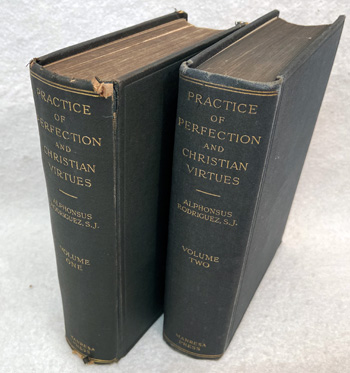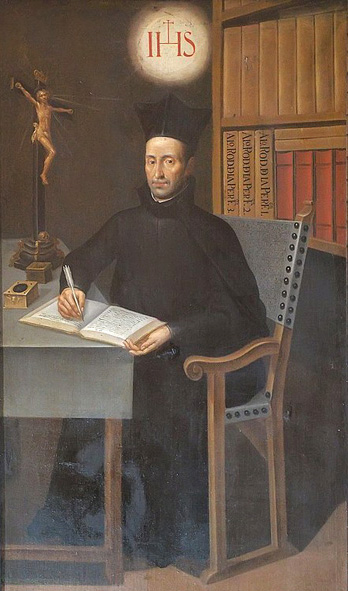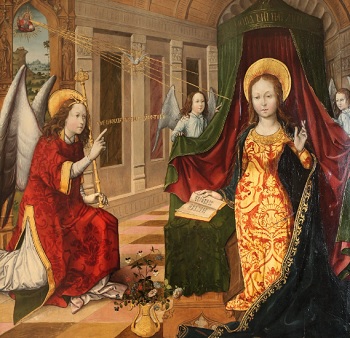Book reviews
 |
 |
 |
 |
 |
 |
 |
The Practice of Christian Perfection
Review of The Practice of Perfection and Christian Virtues in 2 volumes by Alphonsus Rodriguez, SJ, (London. The Manresa Press: Roehampton) 1929

The work is published in three volumes in the United States
This grand work, with its 2 volumes and 11 treatises, is based on exhortations given by Fr. Rodriguez to his Jesuit brethren. Do not be cowed by its size: It is very easy to study and can be read by the simple folk as well as priests. Its language is not complex and edifying examples are provided throughout the work.
This book addresses topics from fraternal charity and purity of intention to mortification and examination of conscience. I learned many things I never knew before, for example, this small excerpt:
“Before God there are not counted the years of life, but the years of a good life; nor the years of Religion, but the years in which one has lived as a good Religious. In the Book of Kings it is said: A son of one year old was Saul when he began to reign; and he reigned two years over Israel (1Kings 13:1). Yet it is certain that he was king for 40 years, as St. Paul says: God gave them forking Saul, son of Cis, for 40 years (Acts xiii. 21).
“Why then is it said that he reigned only two years? Because in the annals and chronicles of God they count only the years of good life; and it is said that he reigned for two years, because it was only for that time that he reigned as a good king.”
The above quote, in and of itself, already conveys a profound lesson.
A book for all
The Practice of Perfection and Christian Virtues is a book that can be recommended to all, not only those aspiring to the religious life. In fact, it would do the laity much good to read books like this one, as they contain a lot of spiritual and practical advice no longer being preached by priests and prelates. Since it was written for those dedicated to spiritual advancement, we can adopt and adapt these teachings and apply them, with prudence, to our individual vocations and states of life.

Fr. Alphonsus Rodriguez, SJ
In general, today’s religious present themselves as the exact opposite of what is taught in this spiritual treatise; it would not be surprising to learn that the modern-day Jesuit has never even seen this book.
For those who would take seriously their vocations, be they religious or lay, Fr. Rodriguez offers this important tip: “One of the chief reasons why we thrive so little in virtue and lag so far behind in perfection, is because we have no hunger and thirst after it: We desire it so feebly and languidly that the desires we have seem rather dead than alive.”
Elsewhere, referring to the purity of intention, he writes: “If you do what you ought, though not a soul be converted, not on that account will your reward be less. In a fine plight certainly would the Apostle St. James be if his reward depended on that and he were to set up his rest on that, since they say he converted only seven or nine persons in the whole of Spain. But not for that did he merit less, or please God less, than the rest of the Apostles.”
Though this illustrious writer has been hidden to the world, his work will impress a practical and useful knowledge on one’s soul.
Humility, the foundation of virtue
The longest treatise of this work, the 11th, is dedicated to the virtue of humility. This fact conveys the great importance of this virtue and how much it was esteemed by our pious author, who was reputed to hate all pride and ostentation.
In these eloquent chapters, we are taught that humility is the foundation of all virtues, of how self-knowledge is a necessary means to attain it, and of the great favors that the Lord grants to the humble.
He teaches: “St. Augustine says there is no sin that one man commits that another man might not commit but for the hand of God lovingly holding him up. And so, when anyone had fallen, one of those ancient Fathers used to weep bitterly, saying, ‘Today for thee, and tomorrow for me.’ That is, as he has fallen, so might I fall, since I am a weak man as he is, and that I have not so far fallen l owe to a particular favor of the Lord.”
Fr. Rodriguez provides examples on how pride is bad even when it has the appearance of virtue, one of them being included here:
“Caesarius [5th century Bishop of Arles, France] relates that they brought to a Cistercian Convent a possessed person to be cured. The Prior went out, and took with him a young religious of great reputation for virtue, whom he knew to be a virgin. The Prior said to the devil: ‘If this monk bids you go out, will you dare to stay?’ The devil answered: ‘I fear him not, because he is proud.’”
The life of Fr. Rodriguez
To end this review, I shall include a quote from a small biographical work about Fr. Rodriguez, written by an early editor of his book:

Fr. Rodriguez was known for his devotion to Our Lady, seat of wisdom
“He was the first at every public duty, most punctual in the least little observances of religious life, and a strenuous assertor of evangelical poverty. …
“To the very last, he never omitted to crawl to the church to hear the confessions of the people, and, in his turn, threw himself daily at the feet of his own confessor to obtain absolution himself. It was a most edifying sight to behold this venerable man, at the age of 90, with the most profound sentiments of humility, stooping to kiss the feet of his religious brethren, as though he was the last and lowest amongst them, and only fit to be trampled underfoot by all around him.” (Vol. 1, p. 15)
By giving this book the attention that it well deserves, I hope the reader will be inspired to pick it up and give a quarter of an hour each day to its wise pages. And may Our Lady teach us the true art of Christian perfection in our lives, which, as true counter-revolutionaries, entails not only loving and adopting the good but also hating and rejecting the evil.

Posted April 5, 2024
______________________








